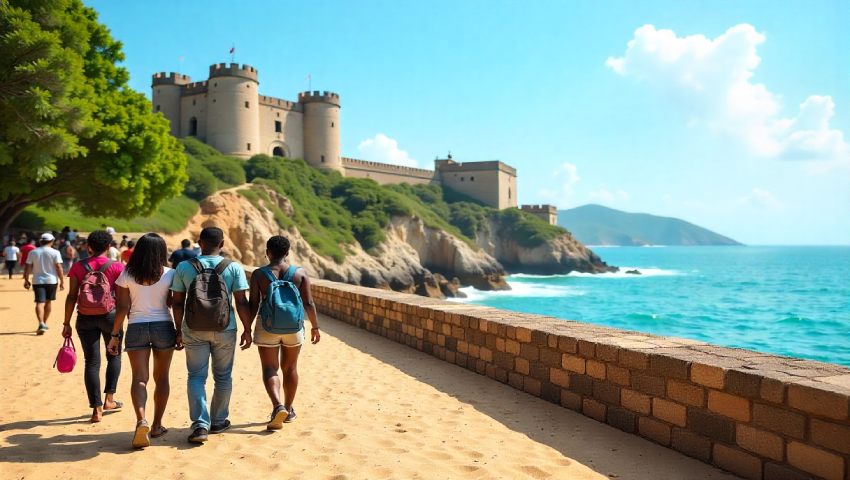By Ghana News
Copyright ghanamma

Ghana’s tourism sector has emerged as a major contributor to the national economy, with a substantial boost in revenue generated from international visitors. According to the latest data released by the Ghana Statistical Service (GSS), the country’s tourism industry generated GH₵15.42 billion between the last quarter of 2022 and the third quarter of 2023. This growth represents a pivotal moment for the sector, highlighting tourism’s increasing role in driving economic growth, employment, and investment across the country.
Visitor Statistics: Growing Interest from International Tourists
The Ghana International Travellers’ Survey revealed that during this period, 901,448 international visitors made their way to Ghana, reflecting a growing interest in the country’s vibrant culture, history, and natural beauty. Of these visitors, 888,584 were overnight visitors, while 12,864 were same-day visitors. These figures underscore the country’s growing popularity as a travel destination, both for those seeking short visits and for those looking to stay longer and immerse themselves in the country’s offerings.
The significant proportion of overnight visitors suggests a strong appeal for Ghana as a destination for longer stays, allowing tourists to explore a variety of cultural and historical sites. The survey highlights the importance of enhancing services for international tourists, as overnight stays often lead to higher spending, benefiting local economies and businesses.
Expenditure Breakdown: Key Contributions to the Economy
In terms of expenditure, the tourism sector made a substantial economic impact, with overnight visitors contributing a total of GH₵15.18 billion to the economy. Same-day visitors, although fewer in number, still accounted for GH₵24 million in expenditure. The larger contribution from overnight visitors indicates that those spending multiple days in Ghana are significantly boosting the country’s tourism revenue. This also emphasizes the potential for sustainable tourism models that focus on longer stays, which could help increase the economic benefits from international visitors.
By capturing detailed expenditure data, the GSS has provided crucial insights into how spending is distributed across different visitor types. This allows for more targeted strategies to maximize revenue and enhance the visitor experience.
Top Tourist Attractions: Highlights of Ghana’s Rich Heritage
Ghana’s unique tourist attractions continue to draw significant numbers of visitors. Key sites include the Bisa Abrewa Museum, Cape Coast Castle, the Kwame Nkrumah Memorial Park, Independence Square, and the National Museum. These iconic locations are integral to Ghana’s tourism offering, representing the country’s rich cultural heritage, historical significance, and national pride.
Bisa Abrewa Museum showcases the artistic history of Ghanaian culture, while Cape Coast Castle stands as a historical testament to the transatlantic slave trade.
The Kwame Nkrumah Memorial Park honors Ghana’s first president, a symbol of independence and leadership in Africa.
Independence Square and the National Museum are central to the country’s political and cultural narrative, attracting visitors who are eager to explore Ghana’s independence journey and the artifacts that define its national identity.
The sustained interest in these cultural landmarks suggests that heritage tourism plays a vital role in Ghana’s tourism strategy. There is a growing opportunity to further promote these attractions through targeted marketing and enhanced visitor services.
Purpose of Visit: Understanding the Motivations Behind Travel
The primary reasons for visiting Ghana are categorized into visiting friends and relatives, business, and leisure. According to the survey, the most reported reason for international travel to Ghana was to visit family and friends, reflecting the importance of diaspora connections. This highlights the role of family and community tourism, which not only boosts the economy but also fosters deeper cultural exchanges.
Business tourism is also a significant contributor, driven by Ghana’s increasing role as a business hub in West Africa. The country’s political stability and economic reforms have made it an attractive destination for international meetings, conferences, and investment opportunities.
Leisure tourism continues to thrive, fueled by Ghana’s natural beauty, vibrant cities, and historical landmarks. With its rich culture and growing infrastructure, Ghana is increasingly recognized as a leisure destination for travelers looking to explore new and diverse experiences.
GSS’s Breakthrough in Tourism Data Collection and Impact
The release of the Tourism Satellite Account (TSA) is a groundbreaking achievement for Ghana, as it allows for a more accurate understanding of the tourism sector’s direct contribution to the economy. This account is the first of its kind for Ghana and represents a significant step forward in addressing long-standing gaps in tourism statistics.
By establishing this comprehensive account, the GSS provides policymakers, sector planners, and investors with robust data that can be used to shape effective strategies for tourism growth. This breakthrough helps define tourism not only as a cultural and social asset but also as a driver of jobs, investment, and growth.
Recommendations for Future Growth: Expanding and Enhancing Tourism
The GSS report has outlined key recommendations to expand Ghana’s tourism sector further, focusing on diversifying accommodation offerings, enhancing the visitor experience, and promoting short-stay tourism. By targeting these areas, Ghana can increase the overall number of international visitors and extend the duration of stays.
Additionally, the GSS has stressed the importance of sustainable tourism practices to preserve the country’s cultural and natural resources. A focus on eco-tourism and conservation will not only ensure that tourism remains an essential contributor to the economy but will also protect Ghana’s heritage for future generations.
Conclusion: A Promising Future for Ghana’s Tourism Industry
Ghana’s tourism sector is thriving, with significant contributions to the economy and continued growth in international visitors. The data collected by the Ghana Statistical Service provides a clear picture of the sector’s impact and sets the foundation for future developments. With the introduction of the Tourism Satellite Account, Ghana is well-positioned to leverage tourism for economic diversification and job creation.
By continuing to focus on key areas such as infrastructure development, sustainable tourism, and improving the visitor experience, Ghana is poised to become a premier destination in West Africa and beyond. The future of Ghana’s tourism looks bright, and the country is set to capitalize on its rich heritage and growing appeal to international tourists.



